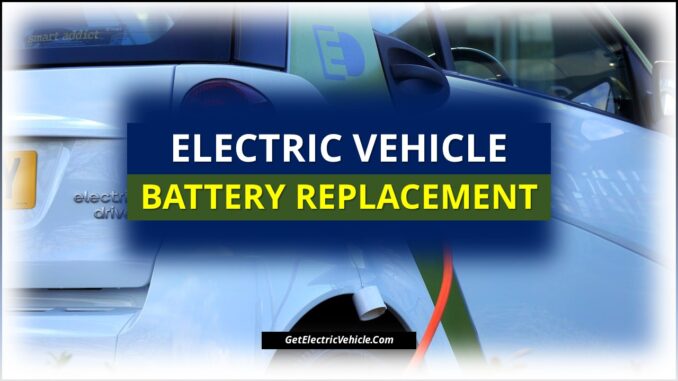
As the adoption of electric vehicles (EVs) gains momentum in India, one of the key concerns for potential buyers is the cost associated with battery replacement – the electric vehicle battery replacement cost.
Understanding the battery replacement cost and its long-term viability is crucial for consumers considering the switch to electric vehicles.
In this article, we delve into the subject of EV battery replacement cost in India, exploring the current scenario, factors influencing the cost, and potential future developments.
Why Do EV Batteries Eventually Need To Be Replaced?
When the vehicle is plugged in for charging, the EV battery undergoes a “charge” cycle and a “discharge” cycle during the operation. Repeating these charging and discharging cycles over time has an impact on how much charge the battery can store and inevitably affects the range of an EV.
The majority of battery manufacturers provide a battery pack warranty of five to eight years. On the other hand, an electric car battery is anticipated to last between 10 and 20 years before needing to be replaced.
While it might be sufficient for a phone, it is insufficient for a vehicle designed to travel thousands of miles, hence EV makers go to great lengths to increase the battery life of electric vehicles.
Additionally, batteries in electric cars are ‘buffered,’ which means they can’t be used to their full potential. This reduces the number of cycles the battery undergoes thus increasing the lifespan of the battery.
Current Battery Replacement Landscape
At present, the cost of replacing an electric vehicle battery in India can be relatively high, depending on the make and model of the vehicle.
The battery accounts for a significant portion of an EV’s overall cost, and its replacement cost can vary greatly, ranging from a few hundred thousand rupees to several lakhs, depending on the capacity, technology, and brand.
Factors Influencing Electric Vehicle Battery Replacement Cost
#1. Battery Capacity and Technology
The capacity and technology of an electric vehicle’s battery play a crucial role in determining its replacement cost. Batteries with higher energy density and advanced technologies tend to be more expensive.
However, advancements in battery technology are continuously driving down costs, making EVs more affordable in the long run.
#2. Battery Warranty
Most electric vehicles come with a warranty on their battery, typically ranging from 5 to 8 years. During this period, if the battery’s performance drops below a certain threshold, the manufacturer may replace it under warranty.
Understanding the terms and duration of the battery warranty is important, as it significantly impacts the potential replacement cost for the owner.
#3. Market Competition
The presence of multiple EV manufacturers and increased market competition can lead to a reduction in battery replacement costs.
As more manufacturers enter the market and battery production scales up, economies of scale are achieved, resulting in cost efficiencies that are eventually passed on to the consumers.
Future Outlook and Cost Reduction
The cost of electric vehicle batteries has been steadily declining over the years, thanks to technological advancements, increased manufacturing capacity, and economies of scale.
It is projected that the cost of electric vehicle batteries could drop by around 50% in the next decade, making EVs even more affordable and competitive with traditional combustion engine vehicles.
Furthermore, research and development efforts in battery technology are focused on improving energy density, charging speeds, and longevity.
Breakthroughs in these areas can significantly extend battery life and reduce the need for frequent replacements, further driving down the long-term costs associated with EV ownership.
Government Initiatives and Support
The Indian government recognizes the importance of electric vehicles in achieving sustainable mobility and has implemented several measures to promote their adoption.
Incentives, subsidies, and tax benefits are being provided to encourage EV purchases, which indirectly helps offset the potential battery replacement cost for consumers.
Additionally, the government is actively investing in research and development, supporting domestic battery manufacturing, and promoting collaborations between academia, industry, and research institutions.
These initiatives aim to enhance battery technology, production capacity, and affordability in the long run.
Calculating the Cost
The price of a 1kwh battery pack has gone up to 18,000-22,000 rupees approximately. In India which is the approximate price- it may vary depending on the Indian state. if we consider the price of a 1 kWh lithium-ion battery pack is somewhere between 15,000 to 20,000 thousand, so The replacement price of the Tata Nexon EV Battery Pack will be around 5.50 Lakh to 6.20 Lakh in India
The replacement price of the MG ZS EV Battery Pack (44.5 kWh 394 V lithium-ion) will be around Rs 6.60 lakh to Rs 8.50 lakh in India.
Conclusion
The cost of electric vehicle battery replacement in India is a crucial consideration for potential buyers. While the initial battery replacement cost may seem high, it is important to analyse the long-term benefits and evolving market dynamics.
As battery technology advances and economies of scale kick in, the cost of electric vehicle batteries is expected to decrease significantly, making EV ownership more affordable and viable in the coming years.
Government support and initiatives, along with increasing competition among manufacturers, will play a pivotal role in driving down battery replacement costs.
As India continues its journey towards a greener future, the affordability of electric vehicle battery replacements will become more accessible, making EVs an attractive and sustainable choice for Indian consumers